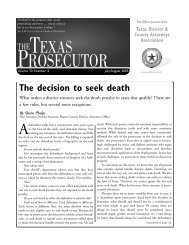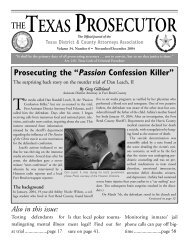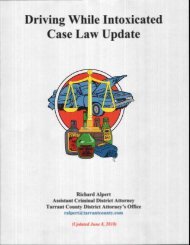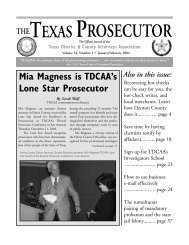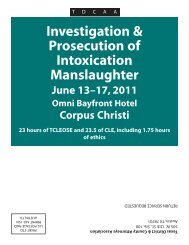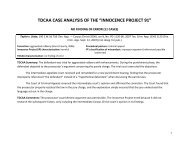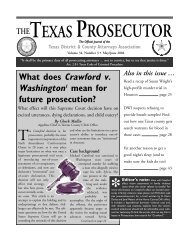Driving While Intoxicated Case Law Update - Texas District ...
Driving While Intoxicated Case Law Update - Texas District ...
Driving While Intoxicated Case Law Update - Texas District ...
Create successful ePaper yourself
Turn your PDF publications into a flip-book with our unique Google optimized e-Paper software.
out that hearsay is generally admissible in a suppression hearing but even if the State could not<br />
rely on hearsay to establish reasonable suspicion, an officer's testimony regarding a vehicle<br />
registration check, like testimony regarding a driver's license check, is admissible under the public<br />
records exception.<br />
Kimball v. State, 24 S.W.3d 555 (Tex.App.-Waco 2000, no pet.).<br />
Officer was properly allowed, over objection, to relarte information he received over the police radio<br />
by unidentified dispatcher that unknown motorist had called 91 1 to report possibly intoxicated driver<br />
in vehicle matching defendant's. Court sfafed that an officer should be allowed to relate the<br />
information on which he was acting. Such information is not hearsay as it is not offered for the<br />
truth of the maffer ass erted but to show how and why the defendant's vehicle was initially identified<br />
and followed.<br />
Ellis v. State, 99 S.W.3d 783 (Tex.App.-Houston [1 Dist.] 2003, pet ref'd.).<br />
Officer testified fhaf basis for stop was he ran defendant's license plate on the computer in his car<br />
and received a response that appellant's car had possibly been involved in a robbery three days<br />
earlier. Defendant objected on basis of hearsay. Here, the testimony was not offered to prove the<br />
truth of the mafferasserted; itwasoffered to show probable cause forthe detention when appellant<br />
was sfopped for traffic violations.<br />
4. ANONYMOUS TIP FROM EMS TECHNICIAN<br />
Glover v. State, 870 S.W.2d 198 (Tex.App.-Fort Worth 1994, pet. refld).<br />
It was proper for officer who witnessed no erratic driving and based the stop solely on information<br />
provided by EMT to make said sfop.<br />
5. INFORMATION COMMUNICATED TO 911 OPERATOR BUT NOT TO<br />
OFFICER WILL SUPPORT STOP<br />
Derichsweiler v. State , 2011 WL 255299 (Tex.Crim.App. 2011), s.ct. cert.denied, Oct. 3, 2011.<br />
The Court holds that a 91 1 police dispatcher is to be regarded as a cooperating officerfor purposes<br />
of making a reasonable suspicion determination. Therefore, if information is reported to the 911<br />
operator, that information will go to support reasonable suspicion to stop an individual even if that<br />
information is not communicated to the officer who performs the stop.<br />
r_3



